高中英语必修一人教版:Unit+1+language+points教学设计.doc
2019新人教高中英语必修一unit1language points单元词汇句型教案
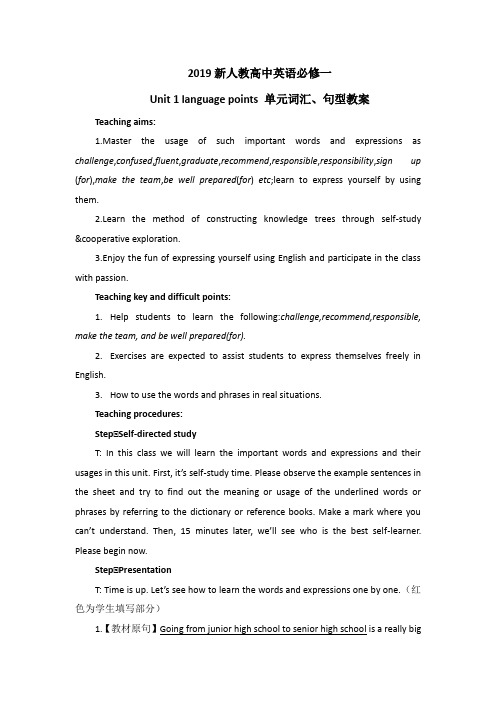
2019新人教高中英语必修一Unit 1 language points 单元词汇、句型教案Teaching aims:1.Master the usage of such important words and expressions as challenge,confused,fluent,graduate,recommend,responsible,responsibility,sign up (for),make the team,be well prepared(for) etc;learn to express yourself by using them.2.Learn the method of constructing knowledge trees through self-study &cooperative exploration.3.Enjoy the fun of expressing yourself using English and participate in the class with passion.Teaching key and difficult points:1.Help students to learn the following:challenge,recommend,responsible, make the team, and be well prepared(for).2.Exercises are expected to assist students to express themselves freely in English.3.How to use the words and phrases in real situations.Teaching procedures:StepⅠSelf-directed studyT: In this class we will learn the important words and expressions and their usages in this unit. First, it’s self-study time. Please observe the example sentences in the sheet and try to find out the meaning or usage of the underlined words or phrases by referring to the dictionary or reference books. Make a mark where you can’t understand. Then, 15 minutes later, we’ll see who is the best self-learner. Please begin now.StepⅠPresentationT: Time is up. Let’s see how to learn the words and expressions one by one.(红色为学生填写部分)1.【教材原句】Going from junior high school to senior high school is a really bigchallenge.从初中过渡到高中真是一项巨大的挑战。
人教版高中英语必修一Unit1 Language points 教学设计
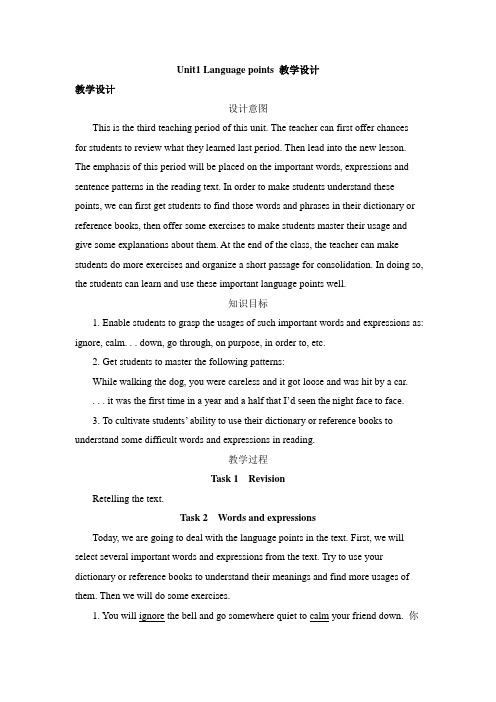
Unit1 Language points 教学设计教学设计设计意图This is the third teaching period of this unit. The teacher can first offer chancesfor students to review what they learned last period. Then lead into the new lesson. The emphasis of this period will be placed on the important words, expressions and sentence patterns in the reading text. In order to make students understand these points, we can first get students to find those words and phrases in their dictionary or reference books, then offer some exercises to make students master their usage and give some explanations about them. At the end of the class, the teacher can make students do more exercises and organize a short passage for consolidation. In doing so, the students can learn and use these important language points well.知识目标1. Enable students to grasp the usages of such important words and expressions as: ignore, calm. . . down, go through, on purpose, in order to, etc.2. Get students to master the following patterns:While walking the dog, you were careless and it got loose and was hit by a car.. . . it was the first time in a year and a half that I’d seen the night face to face.3. To cultivate students’ ability to use their dictionary or reference books to understand some difficult words and expressions in reading.教学过程Task 1 RevisionRetelling the text.Task 2 Words and expressionsToday, we are going to deal with the language points in the text. First, we will select several important words and expressions from the text. Try to use your dictionary or reference books to understand their meanings and find more usages of them. Then we will do some exercises.1. You will ignore the bell and go somewhere quiet to calm your friend down. 你就不要理会铃声了,找个安静的地方去安慰你的朋友。
人教版高中英语必修1 第一单元 unit 1 单元整体教案设计

U nit one FriendshipTeaching aims:1.能力目标:a.Listening: get information and views from the listening material;b.Speaking: express one’s attitude or views about friends and friendship inappropriate words.c.Reading: enable the Ss to get the main idead.Writing: write some advice about making friend as an editor2.知识目标:a.Talk about friends and friendship; how to make friends; how to maintainfriendshipe the following expressions:I think so. / I don’t think so.I agree. / Idon’t agree.That’s correct.Of course not.Exactly.I’m afraid not.c. to enable the Ss to control direct speech and indirect speechd. vocabulary: upset , calm , concern , loose, Netherlands, German, series, outdoors, dusk, crazy , purpose , thunder , entire, entirely, power , curtain, dusty, partner, settle, suffer , highway,recover, pack, suitcase, overcoat, teenager, exactly, disagree, grateful, dislike, tip , swap , itemadd up \ calm down\ have got to \be concerned about \ walk the dog \ go through \ set down \a series of \ on purpose \ in order to \at dusk \ face to face \ no longer\not …any longer\ suffer from\ get\be tired of \ pack sth. up \get along with \ fall in love \ join in3. 情感目标:a. To arose Ss’ interest in learning English;b. To encourage Ss to be active in the activities and make Ss to be confident;c. To develop the ability to cooperate with others.4. 策略目标:a. To develop Ss’cognitive strategy: taking notes while listening;b. To develop Ss’ municative strategies.5. 文化目标:to enable the Ss to get to know different opinions about making friends from different countries.Teaching steps:Period oneStep1. Warming up1. Ss listen to an English song AULD LANG SYNE.2. Brainstorming: let Ss say some words about friendship – honest, friendly, brave,humorous, funny, wise, kind, open-minded, responsible, helpful….Step 2. Talk about your old friends1.Ss talk about their old friends in Junior Middle School, talk about theirappearance, personality, hobbies, etc.2.Self-introductionStep 3. Make new friends1.Ss go around and ask their new friends some information and fill in the followingStep 4. Do a surveySs do the survey in the text ,P1Sep 5. Listening and talkingDo Wb P41 (Talking). While Ss listen to the material, ask them to take notes about the speaker’s views of making friends.When Ss make their conversation, ask them to try to use the following expressions.I think so. / I don’t think so. I agree. / Idon’t agree.That’s correct. Of course not. Exactly. I’m afraid not.Step 6. DiscussionDivide Ss four in one group and each group choose a topic to discuss. There are four topics.Topic 1: Why do you need friends? Make a list of reasons why friends are important to you.Topic 2: There is a saying “to have a good friend, you need to be a good friend.〞What do you think of the saying and how can you be a good friend?Topic 3: Does a friend always have to be a person? What else can be your friend? Why? Topic 4: List some qualities of a person who does not make friend easily.Step 7. Summary1.Ask Ss themselves to summarize what is friendship and what is the most importantin making friends.2.T shows more information about friendship and a poem about friendship.What is friendship?I want to find the answer to the questionWhat is friendship?When it rains, I think friendship is a small umbrella.It can give me a piece of clear sky.When I’m crying, I think friendship is a white handkerchief.It can wipe my tears dry.When I am sad, I think friendship is a warm word.It can bring me happiness again.When I am in trouble, I think friendship is a strong hand.It can help me escape my troubles.When I sit in a quiet place, I think friendship is a very wonderful feeling.It can’t be pulled and torn, because it is in everyone’s heart.It is there from the beginning to the end of our lives.3. Tell Ss: make new friends and keep the old; one is silver and the other is gold. Step 8. Evaluation1.Look up the new words and expressions in warming up and pre-reading in adictionary.2.Write a short passage about your best friend.Period twoStep1.Warming upActivity1: Suppose you have to stay indoors to hide yourself for a whole year. You can never go outdoors, otherwise you will be killed. You have no telephone, puter, or TV at home.How would you feel?What would you do?Four students a group discuss with each other for 2 minutes.Activity2: Play a short part of the movies Schindler’s ListStep2. PredictingStudents read the title of the passage and observe the pictures and the outline of it to guess:Who is Anne’s best friend?What will happen in the passage?Step3. SkimmingStudents skim the passage in 2 minutes to get the main idea :Who is Anne’s best friend?When did the story happen?Step4. ScanningStudents work in pairs to find the information required below:Annein World War ⅡWhat ?How to enjoyherself?Why?Step5. Intensive readingStudents work in group of four to discuss the following open questions:1.Why did the windows stay closed?2.How did Anne feel?3.What do you think of Anne?4.Guess the meanings of “spellbound〞, “ hold me entirely in their power〞from the discourse(语篇,上下文).5.Which sentences attract you in the passage?Step6. ActivityFour students a group to discuss the situation:Suppose you four have to hide yourselves for 3 months. During the three months, you will be offered the basic food, water and clothes. Your group can take 5 things with you.What will you take? Why?How will you spend the 3 months?How will you treat each other and make friends ?Task1.Surf the internet to find Anne’s Diary and read some of it. Print out a piece of the diary and write down your feelings after reading it on the page. We will share the pieces and your feelings with the whole class.、3 、4on Page3Period threeStep 1. Warming upCheck the Ss’ assignment: task 2Step 2. Language points:1.add (v.)1). To put together with something else so as to increase the number, size, importance, etc.增加,添加Please add something to what I’ve said, John.2). To join numbers, amount, etc so as to find the total 相加Add up these figures for me, please.add to something: to increase 增加What he did has added to out difficulties.add up to: to amount to 加起来等于;总计The cost added up to 100 million yuan.2. go through1). To examine carefully 仔细阅读或研究I went through the students’ papers last night.2). To experience 经历,遭受或忍受You really don’t know what we went through while working on this project.3. crazy (adj.)1). mad, foolish 疯狂的,愚蠢的It’s crazy to go out in such hot weather.2). wildly excited; very interested 狂热的,着迷的She is crazy about dancing.4. be concerned about/for: be worried about 担心We’re all concerned about her safety.Step 3. Learning about language1.Finish Ex.1, 2 and 3. on Page 4.2.Direct speech and indirect speech: Ss do Ex.1 and 2 on Page 5. Then let the Ssthemselves discover the structures.Step 4. PracticeUsing structures on Page 42: ask the Ss to use indirect speech to retell the story. Step 5. AssignmentFinish Wb. Ex, 1 and2 on page 41 and 42.Period fourStep 1. RevisionCheck the Ss’ assignment.Step 2. R eadingSs read the letter on page 6Notes:1.get along with2.fall in loveStep 3. ListeningSs should take notes while they are listening.1. first listening: Ss listen and answer the questions of part 2 on page 6.2. second listening: Ss listen again and finish part 3 on page 6.Step 4. ListeningSs listen to a story about Anne and try to finish Wb. Ex 1 and 2 on page 43 and page 44.Step 5. SpeakingSs work in groups of four. Design a questionnaire to find out what kind of friends your classmates are. They can use the quiz in the Warming up to help them.Step 6. Assignment1. Ss prepare the reading task on page 44.2. Surf the internet and find some material about friendship in different countries.Period fiveStep 1. Warming upSs say something about making friends and how to maintain friendship.Step 2. ListeningSs listen to a short passage and fill in the blanks on page 41 (listening).Step 3. Reading1.first reading: Ss read the passage about friendship in Hawaii and finish Wb.Ex1.onpage 44.2.second reading: Ss read again and discuss the questions on page 44.3.Ss share their material about friendship in different countries in groups, and thenchoose some groups to show theirs in class.Step 4. assignmentSs collect some proverbs about friendship.Period sixStep 1. Pre-writing1.Read a letter from a student called Xiaodong.2.Go over the advice on page 7 and be ready for writing.Step 2. While-writingAsk the Ss to write a letter to Xiaodong as an editor and give him some advice.1.Ss make a list about the important information that they need.2.Ss begin to write the letter to Xiaodong.3.Ss revise their letters by themselves.4.Ss exchange their writing paper with their partners and correct the mistakes. (tense,spelling, letters, structures….)5.Ss get back their own writing paper and write the letter again.Step 3. Post-writingChoose some students’ writing paper and show in the class. Ask the Ss to correct the mistakes together and also learn from some good writings.Step 4. Writing for fun1.Ss read the passage on page 7 by themselves.2.Ss try to write a few lines to describe their best friends or a person they know.3.Show some Ss’ writings in class.Step 5.AssignmentDo Wb writing task on page 46.Period sevenTeachers can use this period freely.Suggestion: Teachers can use this period to let Ss sum up what they have learned and explain what Ss couldn’t understand very well in this unit. Teachers can also add more practice in this period to consolidate what the Ss have learned. Finally, ask the Ss to finish checking yourself on page 47. It is very important to improve their learning.Unit 1 Friendship(1) 课题:Friendship (2) 教材分析与学生分析:本单元的中心话题是“友谊〞,几乎所有的内容都是围绕这一中心话题展开的。
人教课标版高中英语必修1Unit1_语言点课_公开课教学设计
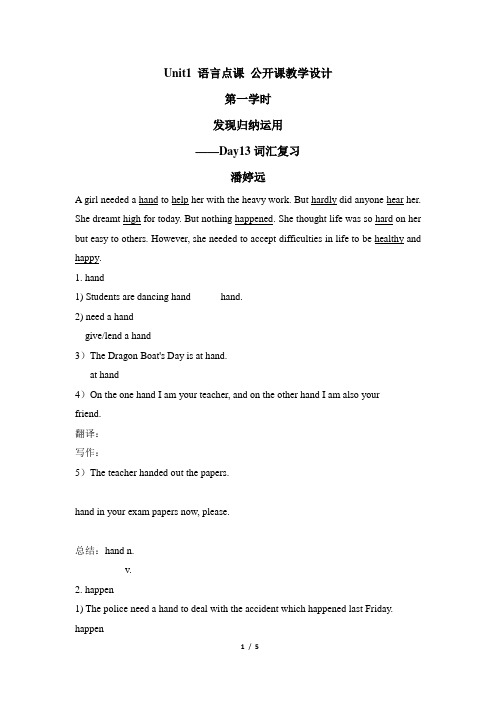
Unit1 语言点课公开课教学设计第一学时发现归纳运用——Day13词汇复习潘婷远A girl needed a hand to help her with the heavy work. But hardly did anyone hear her. She dreamt high for today. But nothing happened. She thought life was so hard on her but easy to others. However, she needed to accept difficulties in life to be healthy and happy.1. hand1) Students are dancing hand _____ hand. _________2) need a hand___________give/lend a hand___________3)The Dragon Boat's Day is at hand.at hand______________4)On the one hand I am your teacher, and on the other hand I am also your friend.翻译:_____________________________________________写作:_____________________________________________5)The teacher handed out the papers._____________________________________________hand in your exam papers now, please._____________________________________________总结:hand n.____________________________________________v.____________________________________________2. happen1) The police need a hand to deal with the accident which happened last Friday. happen__________________2)判断An accident happened last night.An accident was happened last night.总结:“发生”______________________________________:无_____语态。
整理人教版高中英语必修一unit1教案最终版
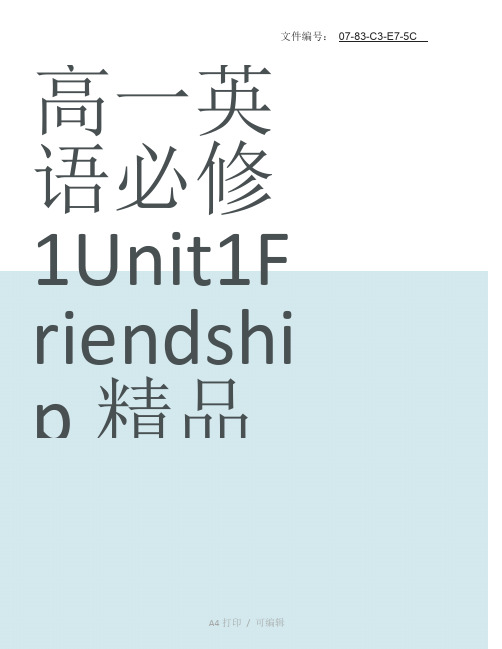
高一英语必修1Unit1F riendshi p精品1.高一英语必修1 Unit 1 Friendship 精品教案(Period 2)Period 2 Reading “Anne’s Best Friend”1. Teaching objectives:1) To develop the students’ reading ability, learn to use some reading strategies such as guessing,key sentences, skimming and so on;2). To get the students to realize the importance of friends and friendship, and to tell true friendsfrom false friends;3). To grasp some useful words and expressions in this passage, such as on purpose, be crazyabout etc.;4). To learn the writing style of this passage.2. Teaching method: T ask-based teaching3). Teaching procedure:Step 1.Pre-reading1. Please enjoy three pieces of music and find out what they are about.2 .Why do you think friends are important to you?3. What do you think a good friend should be like? List the good qualities a good friend shouldhave .4. Have you ever considered making friends with animals, plants or even an object? Why or whynot?Step 2.Reading1. Try to guess what Anne’s friend is and what the passage is about by reading the title andhaving a quick at the pictures in this passage without reading it.2. Skimming the first two paragraphs to confirm your guessing.1) What was Anne’s best friend? Why did she make friends with it?2) Did she have any other true friends then? Why?3) What is the differ ence between Anne’s diary and those of most people?4) Do you keep a diary? What do you think most people set down in their diaries?5) We are going to read one of Anne’s diaries .but before reading ,can you tell me what the diaryis about with the help of one key sentence in the 2nd paragraph?3. Reading of Anne’s diaryHow she felt in the hiding placeTwo examples to show her feelings thenStep 3.Post-reading1.What would you miss most if you went into hiding like Anne and her family? Give your reasons.2.Group workWork in groups to decide what you would do if your family were going to be killed just because they did something the Emperor did not like.Where would you plan to hide?How would you arrange to get food given to you every day?What would you do to pass the time?------3. Discovering useful words and expressionsComplete the following sentences, using words and expressions from Reading1) She has grown _______ about computer games.2) Was it an accident or did David do it on _______?3) From the beginning ,Paul made it clear that he would be ______ (完全地)in control.4) He used to work _______ even in the middle of winter.5) Just the _______ of more food made her feel sick.6) You had better have a _________ talk with him.7) Born in a poor family, the manager _________ lots of hardships in his childhood.8) A diary is often kept to ________ what happens in people’s daily lives.Step 4.T alking about friends and friendship1.There are many proverbs about friends and friendship. Choose the one you agree with and explain why, then choose one you disagree with and explain why.A friend in need is a friend indeed.Friends are like wine; the older, the better.A friend to all is a friend to none.The same man cannot be both friend and flatterer(阿谀奉承者).False friends are worse than open enemies.Walking with a friend in the dark is better than walking alone in the light.2. We have talked about friends and friendship today, can you write one or two sentences to express your understanding of friends and friendship.Step 5.Homework:1. Interview a high school student, a businessman, a police officer and a housewife to find out their opinions about friends and friendship. Write a report to share it with the whole class.2. Describe one of your best friends following the writing style of this passage.Ending: Let’s sing this song about friends together整理丨尼克本文档信息来自于网络,如您发现内容不准确或不完善,欢迎您联系我修正;如您发现内容涉嫌侵权,请与我们联系,我们将按照相关法律规定及时处理。
Unit1UsingLanguage教学设计(一)高中英语人教版选择性
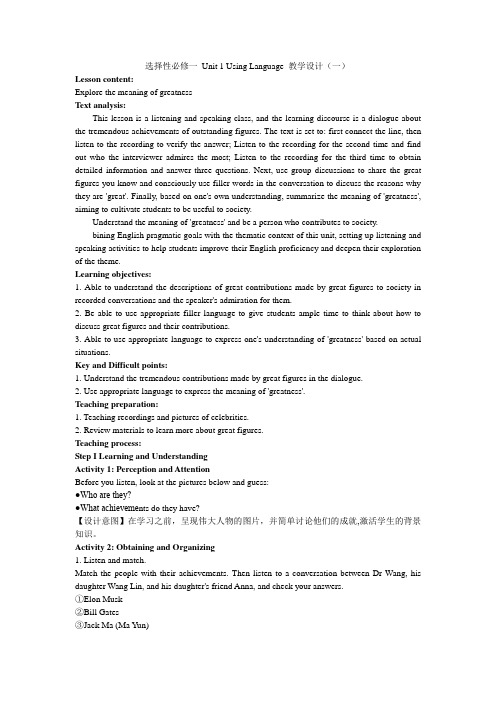
选择性必修一Unit 1 Using Language 教学设计(一)Lesson content:Explore the meaning of greatnessText analysis:This lesson is a listening and speaking class, and the learning discourse is a dialogue about the tremendous achievements of outstanding figures. The text is set to: first connect the line, then listen to the recording to verify the answer; Listen to the recording for the second time and find out who the interviewer admires the most; Listen to the recording for the third time to obtain detailed information and answer three questions. Next, use group discussions to share the great figures you know and consciously use filler words in the conversation to discuss the reasons why they are 'great'. Finally, based on one's own understanding, summarize the meaning of 'greatness', aiming to cultivate students to be useful to society.Understand the meaning of 'greatness' and be a person who contributes to society.bining English pragmatic goals with the thematic context of this unit, setting up listening and speaking activities to help students improve their English proficiency and deepen their exploration of the theme.Learning objectives:1. Able to understand the descriptions of great contributions made by great figures to society in recorded conversations and the speaker's admiration for them.2. Be able to use appropriate filler language to give students ample time to think about how to discuss great figures and their contributions.3. Able to use appropriate language to express one's understanding of 'greatness' based on actual situations.Key and Difficult points:1. Understand the tremendous contributions made by great figures in the dialogue.2. Use appropriate language to express the meaning of 'greatness'.Teaching preparation:1. Teaching recordings and pictures of celebrities.2. Review materials to learn more about great figures.Teaching process:Step I Learning and UnderstandingActivity 1: Perception and AttentionBefore you listen, look at the pictures below and guess:●Who are they?●What achieveme nts do they have?【设计意图】在学习之前,呈现伟大人物的图片,并简单讨论他们的成就,激活学生的背景知识。
高一英语人教版必修1Unit1全套教案

Unit 1 friendship1.Teaching aims and demands2.Suggested teaching notes1). Analyses of the teaching contentsThis unit is about friendship, and nearly all the teaching materials center on it. Warming up---The questionnaire leads students to think and talk aboutfriendship, get to know the problems between friendsand seek solutions, which makes preparations for thefurther teaching in topics, background and vocabulary.Pre-reading---The questions prompt students to think critically aboutfriends and friendship in reality, alerting them to the factthat besides people, a diary can be a friend, too.Reading--- The diary by theJewish girl Anne gave a glimpse of her lifeduring her family’s shelter in Amsterdam from the German Nazis’killing in world war . she treats the diary as her best friend, and in it reveals her longing for a normal life and close contact with nature,which helps her get through the days.Comprehending---It helps students further understand the text by doingmultiple choices, questions and answers, andmatching.Learning about language---It teaches the important expressions andstructures and grammar: direct and indirectspeeches.Using language---The two letters, listening, questionnaire design, letterwriting and fun writing prepares students to furthertalk about friendship, especially the problems withmisunderstanding, and unfriendliness, thusstrengthening students’ abilities to practicelanguage, discover, and solve problems.Summing up---It summarizes the whole contents of this unit from theaspects of topics, vocabulary and grammar.Learning tip--- This part encourages students to form the habit of writinga diary.Integrating skills--- The text introduces the way Hawaiians expressfriendship, to get students to realize the culturaldifferences in the values of friendship in additionits importance in all cultures.2) Making of the teaching planThis unit centers on friends and friendship, exploring different types of friendship with particular attention to that one can develop with oneself,i.e., the comfort and support one seeks from an imaginary friend.Students are expected to come to be truly aware of the qualities and conducts that make a good friend, display and develop the ability tocope with misunderstanding, conflicts and problems related to friendship, and give advice on it. The concept that even an ordinarything can be a friend should break down the traditional belief in the interpersonal nature of friendship. Also, the comparison of similarities dissimilarities in friendship comprehension between the East and theWest leads students to know better the values of friendship in Westerns’eyes. All in all, this unit promises to unveil the true essence of friendshipand helps students to lead a more friendly and harmonious life.Thus, based on the theme, contents and teaching objectives, the whole teaching procedures can fall into five periods as follows:3. Teaching plans for each periodPeriod 1 Warming-up and Speaking1. Teaching objectives:1) Target languageI (don’t) think…… I (don’t) think so. I (don’t) agree.I believe…… That’s correct. In my opinion, ……2) Ability goalsa.Describe your friends in Englishb.Figure out the problems between friends and then find different ways tosolve the problems.3)Learning ability goalsa.To encourage students to think and talk about friends and friendship byusing some phrases and structures.b.To learn to solve problems that may occur between friends.c. To cultivate the students to form the good habit of learning English inSenior Middle School.2. Teaching important points:e the given adjectives and sentence structures to describe one ofyour friends.b.Learn to evaluate friends and friendship.3. Teaching difficult points:a.Work together with partners and describe one of your good friends.b.Discuss with partners and find out ways to solve the problems.4. Teaching methodsa.Task-based teaching and learningb.Cooperative learningc.Discussion5. Teaching aids:CAI6. Teaching procedures and ways:Step 1 Lead-in and Warming-upBefore the lesson, the teacher can arouse the students’ interests by showing a video of Auld Lang Syne .At the beginning of the first class, we can get the students to talk about their summer holidays. The students can talk freely as they like.1.How did you spend your summer holidays How did you feelWhat did you do in your summer holidays What did you do inyour spare time2.What do you think of our new school Do you like it Could yousay something about it3.Do you like making friends How do get in touch with your friendsDo you have many friends Where are they now Do you haveany old friends in our school Have you made any new friends inour classStep 2 Think it over1. Give a brief description of one of your friends. The following phrasesand structures may be helpful:His/Her name is ……He /She is …… years old.He /She likes …… and dislikes ……He /She enjoys …… and hates……He /She is very kind/friendly/……When /Where we got to know each other.2. What types of friendship do you have Please tick them out. Then fillin the blanks.girl friends boy friendspen friendslong -distance friendsfriends of the same agee-friends (friends over the internet) friends across generationsunusual friends like animals, books……1).______ is /are most important to you.2). You spend most of your free time with ____.3). You will share your secrets with _____.4). When in trouble, you will first turn to _____.Step 3 Make a survey1. List some qualities of a good friend or your ideal friend. Have the students get into groups of four to find out what each has listed.Tell your partner your standards of good friends by using the following structure:I think a good friend should (not) be……In my opinion, a good friend is someone who……1.Have a member of each group report on what their lists have in commonand list them on the board.2.Ask the class whether or not they agree with all the qualities listed.3.Then have the students do the survey in the textbook.4.Have the students score their survey according to the scoring sheet onpage 8.5.The teacher ask some students how many points they got for the surveyand assess their values of friendship:★4~7 points: You are not a good friend. You either neglect your friend’s needs or just do what he/she wants you to do. You should think more about what a good friend needs to do.★ 8~12 points: You are a good friend but you sometimes let your friendship become too important, or you fail to show enough concern for your friend’s needs and feelings. Try to strike a balance between your friend’s needs and your own responsibilities.★13+ points: You are an excellent friend who recognizes that to be a good friend you need balance your needs and your friend’s. Well done. (You may also show your students the results above and let themselves self-reflect upon their own values of friendship)Step 4 Talking and sharing( work in pairs)1. If your best friend does something wrong, what will you doTry to use the following phrases:I (don’t) think…… I (don’t) think so.I (don’t) agree. I believe……That’s correct. In my opinion, ……2. What is a friendA British newspaper once offered a prize for the best definition(定义) of a friend. If you were the editior, choose the best one from the following entries(条目), and explain why.One who understands my silence.A friend in need is a friend indeed.Friends are just the people who share your happiness and sorrow.When you look at your watch at 4 am, but still know you can callthem and wake them up, and they’ll still want to talk to you ,that’s friendship.To have a friend, you need to be a good friend.Step 5 Group work (output)The teacher can give each group one of these questions below to talk about. Then let the class share their ideas. It’s better to stimulate the students to express their own opinions about these questions.1.Do you think it is a good idea to borrow money from your friendWhy and Why not2. What factors may cause the breakdown of a good friendship3.What can be your special friend besides human beings And whyStep 6 homework1.Write down a short passage about your ideas /the factors/yourunusual friends.2.Prepare for the new lesson.Period 2 Reading “Anne’s Best F riend”1. Teaching objectives:1) To develop the students’ reading ability, learn to use some reading strategies such as guessing, key sentences, skimming and so on;2). To get the students to realize the importance of friends and friendship,and to tell true friends from false friends;3). To grasp some useful words and expressions in this passage, such as on purpose, be crazy about etc.;4).To learn the writing style of this passage.2. Teaching method: Task-based teaching3). Teaching procedure:Step 1.Pre-reading1. Please enjoy three pieces of music and find out what they are about.2 .Why do you think friends are important to you3. What do you think a good friend should be like List the good qualities a good friend should have .4. Have you ever considered making friends with animals, plants or even an object Why or why notStep 2.Reading1.Try to guess what Anne’s friend is and what the passage is about by reading the title and having a quick at the pictures in this passage without reading it.2.Skimming the first two paragraphs to confirm your guessing.1) What was Anne’s best friend Why did she make friends with it2) Did she have any other true friends then Why3) What is the difference between Anne’s diary and those of most people4) Do you keep a diary What do you think most people set down in their diaries5) We are going to read one of Anne’s diaries .but before readi ng ,can you tell me what the diary is about with the help of one key sentence in the 2nd paragraph3.Reading of Anne’s diaryHow she felt in the hiding placeTwo examples to show her feelings thenStep 3.Post-reading1.What would you miss most if you went into hiding like Anne and her family Give your reasons.2.Group workWork in groups to decide what you would do if your family were going to be killed just because they did something the Emperor did not like.Where would you plan to hideHow would you arrange to get food given to you every dayWhat would you do to pass the time------3. Discovering useful words and expressionsComplete the following sentences,using words and expressions from Reading1) She has grown _______ about computer games.2) Was it an accident or did David do it on _______3) From the beginning ,Paul made it clear that he would be ______ (完全地)in control.4) He used to work _______ even in the middle of winter.5) Just the _______ of more food made her feel sick.6) You had better have a _________ talk with him.7) Born in a poor family, the manager _________ lots of hardships in his childhood.8) A diary is often kept to ________ what happens in people’s daily lives.Step 4.Talking about friends and friendship1.There are many proverbs about friends and friendship. Choose the one you agree with and explain why, then choose one you disagree with and explain why.A friend in need is a friend indeed.Friends are like wine; the older,the better.A friend to all is a friend to none.The same man cannot be both friend and flatterer(阿谀奉承者).False friends are worse than open enemies.Walking with a friend in the dark is better than walking alone in the light.2.We have talked about friends and friendship today, can you write one or two sentences to express your understanding of friends and friendship.Step 5.Homework:1.Interview a high school student, a businessman, a police officer and a housewife to find out their opinions about friends and friendship. Write a report to share it with the whole class.2. Describe one of your best friends following the writing style of this passage. Ending: Let’s sing this song about friends togetherPeriod3 GrammarDirect & Indirect SpeechI Statements & Questions1.Teaching objectivesLearn to use direct speech and indirect speech2. Teaching important pointSummarize the rules of Direct Speech and Indirect Speech.3. Teaching difficult pointLearn about the special cases in which the tenses shouldn’t be changed.4.Teaching methodsDiscussing, summarizing and practicing.5. Teaching proceduresStep1Lead inT:Good morning, class. In the last lesson, we learned Anne’s story. Now she is telling her stories to two of her friends—you and Tom. Tom has something wrong with his ears,so you have t o repeat Anne’s sentences, Sometimes you need to explain Tom’s sentences to the class. Look at the blackboard.“I have to stay in the hiding place.” said Anne.→T:What did Anne say As we know , Tom has something wrong with his ears,so you have to repeat Anne’s sentence.Ok,first of all, let’s translate the sentence into Chinese.安妮说:“我不得不呆在躲藏处。
人教版高中英语必修一 第一单元 教学设计
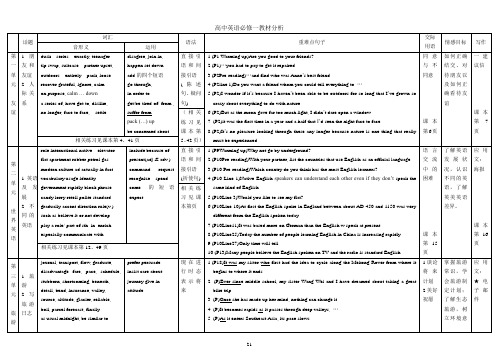
release relative terror reward
opinion escape quality however
active vote cruelty devoted
educated in trouble out of work
2.(P10Pre-reading)With your partner, list the countries that useEnglishas an official language.
3.(P10 Pre-reading)Which country do you think has the mostEnglishlearners?
定语从句I
关系代词
1.It seemed as if the world was at an end!
2.It was felt in Beijing, which is more than two…
3.Never before in history has a city been so completely destroyed.
4.(P2line 1)Do you want a friend whom you could tell everything to…
5.(P2)Iwonder if it’s becauseIhaven’t been able to be outdoors for so long that I’ve grown so crazy about everything to do with nature.
相关练习见课本第页
第五单元
曼德拉
1伟人的品质
人教版高一英语必修1 UNIT1教学设计案例
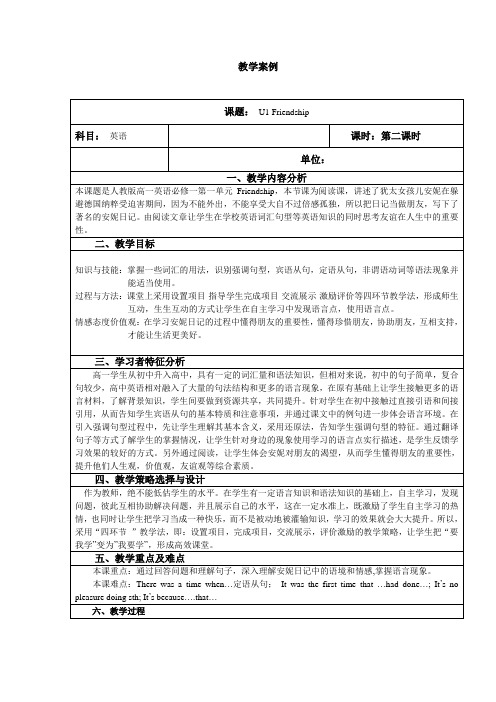
本课重点:通过回答问题和理解句子,深入理解安妮日记中的语境和情感,掌握语言现象。
本课难点:Therewasatimewhen…定语从句;Itwasthefirsttimethat…haddone…;It’snopleasuredoingsth;It’sbecause….that…
六、教学过程
从学生课堂反馈来看,学生拥有了一定的语言感知水平,能够使用所学语言点实行新的语言项目的完成,但课后写到讨论结果却发现,学生的书写有问题,并且词汇拼写错误及有适量的语法错误。由此可知,在今后的学习指导中,老师要严格要求学生,锤炼笔头表达水平,语言输出的精确性有待增强。
观察图片及文章题目,浏览问题后,带着问题快速阅读文章
培养学生阅读理解水平
指导学生进一步阅读理解文章内容并找出语言点
阅读文章,找出语言点,并交流展示
学生精读文章,学习语言点,提升使用语言水平
七、教学评价设计
1.小组评价
组别
1
2
3
4
得分
组内贡献奖得主
2.自我评价
Fromthisperiod,Ihavelearnedthefollowing:
在这节课中,学生对语言点的掌握和理解比较到位,并且能够从以前的语言知识中做到举一反三,这充分说明了,即使是新课程,也不一定都需要老师把知识一点点灌输,学生以旧带新的学习方式,更符合他们的认知规律。此外,学生在交流展示过程中,大胆,规范,并且能大胆提出问题,并能说出自己的理解,这个点难能可贵。整节课,学生思维活跃,课堂气氛热烈而不喧闹,彰显了学生的学习热情和求知欲望,并能适当使用所学的语言点造句并创立新语境,达到了预期的课堂效果。
Grammar:_________________________________________________________________
高中英语必修一unit1教学设计

高中英语必修一unit1教学设计一、教学任务及对象1、教学任务本教学设计针对的是高中英语必修一unit1的内容。
该单元主要围绕“友谊”这一主题展开,通过不同场景下的对话和阅读材料,让学生掌握描述友谊的相关词汇和表达方式,理解友谊的内涵和重要性,并能够运用所学知识进行实际的语言交流。
教学任务包括:词汇学习、语法讲解、对话练习、阅读理解、写作训练以及跨文化交际能力的培养。
2、教学对象本教学设计的对象是高中一年级的学生,他们已经具备一定的英语基础,但在语言表达、词汇积累、语法理解和实际应用方面仍有待提高。
此外,学生在学习过程中可能存在个体差异,因此在教学过程中要注意因材施教,关注每个学生的学习需求和兴趣,激发他们的学习积极性,提高课堂参与度。
二、教学目标1、知识与技能(1)掌握与友谊相关的词汇,如:friendship、loyalty、trust、bond、confidant等,并能正确运用这些词汇进行表达。
(2)学会使用一般现在时、一般过去时和现在进行时等基本时态描述朋友间的互动和经历。
(3)掌握基本的英语语法规则,如主谓一致、名词所有格等,并在实际语境中运用。
(4)提高英语听力理解能力,能听懂并参与有关友谊话题的讨论和对话。
(5)提升英语口语表达能力,能够流利地与同学进行关于友谊的交流,分享个人观点和经历。
(6)培养阅读技巧,通过阅读有关友谊的文章,提高阅读速度和理解能力。
(7)锻炼写作能力,能够撰写关于友谊的短文,表达自己的思想和感受。
2、过程与方法(1)采用情景教学法,让学生在实际语境中学习英语,提高语言运用能力。
(2)运用任务型教学法,引导学生通过完成各种任务,培养合作意识和解决问题的能力。
(3)利用多媒体教学资源,如视频、音频、图片等,激发学生的学习兴趣,提高课堂氛围。
(4)鼓励学生参与课堂讨论,培养批判性思维和表达能力。
(5)组织小组活动,让学生在合作中相互学习、相互促进,提高学习效率。
优质人教版高中英语 必修1 Unit1 Friendship Language points 教案

高一英语新授课导学案(Unit1Friendship) Period Twolanguage study (1)目标导航掌握并运用下列单词短语及句型。
be good to, add, get sth.done, ignore, calm, concern, should have done…go through, before, set down, a series of, crazy, in order to, far too, too much, It is/ was the first time…知识讲练(注:带★号部分为课本原文)I.Warming up1.★Are you good _____ your friends? A. to B. for对比:be good to sbbe good for sb①The boss has always been very good _________ her.②This weather is very good _______________crops.③Eating vegetables is good __________________ you.2..★Add up your _______ and see how many _______ you get. (points, score)【导学】add vt. 加,增加,补充说或写add to增添add …to…把…加到…add up 合计,加起来add up to加起来总共,总计①Will you _______ some sugar _____ the coffee, please?请在咖啡里加点糖好么?②The _______ of music adds ____ our enjoyment.这首音乐给我们增添了欢乐。
③翻译:a. "I will come later. " he added. __________b. If you add 5 to 3, you will get 8.____________④改错:The examination has added our pressure(压力).⑤Please_____ the numbers and I’m sure they will ______ more than 1,000.A. add; add upB. add up; add upC. add up; add up toD. add to; add up3.★Your friend asks to borrow your ___________(最喜欢的) _______(照相机). When he / she borrowed it last time, he / she broke it and you had to pay to get it _______(修理).get / have sth. done 叫别人做某事①Tomorrow I shall _______ my computer _______. 明天我将找人把我的电脑修理一下。
人教版高中英语必修一unit1教案最终版
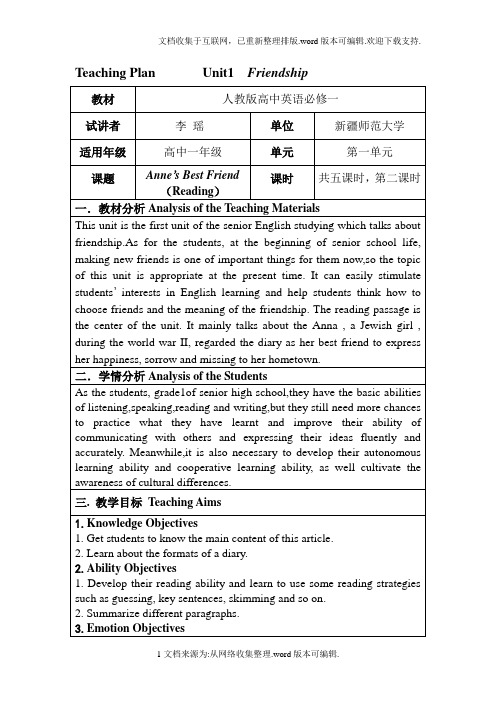
三. 教学目标 Teaching Aims
1.Knowledge Objectives 1. Get students to know the main content of this article. 2. Learn about the formats of a diary. 2.Ability Objectives 1. Develop their reading ability and learn to use some reading strategies such as guessing, key sentences, skimming and so on. 2. Summarize different paragraphs. 3.Emotion Objectives
四. 教学重点、难点 Teaching Key and Difficult Points
1.Teaching Key Points 1.To make the students understand the meaning of friendship. 2.To make the students be able to describe their own friends. 3. Learn about the formats of a diary. 2.Teaching Difficult Points 1.To make the students be able to use different vocabularies about friend and friendship. 2.To make the students understand this unique history.
文档收集于互联网,已重新整理排版.word 版本可编辑.欢迎下载支持.
人教版高中英语必修一教案:Unit1FriendshipLanguagepoints
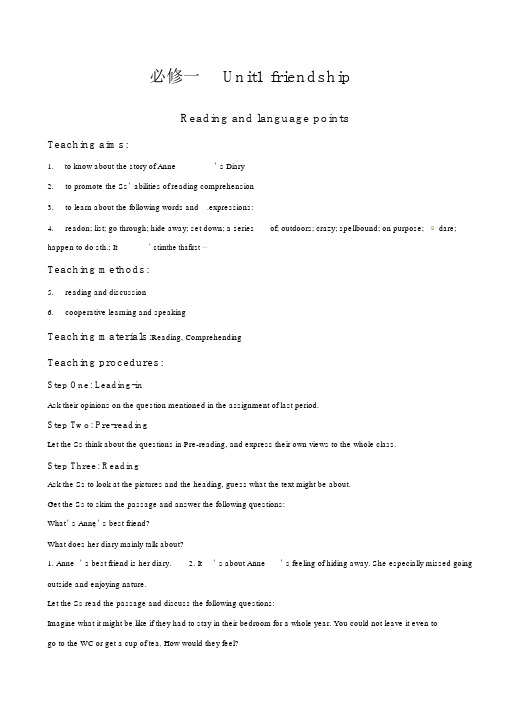
必修一Unit1 friendshipReading and language pointsTeaching aims:1. to know about the story of Anne’ s Diary2.to promote the Ss’ abilities of reading comprehension3.to learn about the following words and expressions:4.readon; list; go through; hide away; set down; a series of; outdoors; crazy; spellbound; on purpose;dare; happen to do sth.; It’ stimthe thafirst⋯Teaching methods:5.reading and discussion6.cooperative learning and speakingTeaching materials:Reading, ComprehendingTeaching procedures:Step One: Leading-inAsk their opinions on the question mentioned in the assignment of last period.Step Two: Pre-readingLet the Ss think about the questions in Pre-reading, and express their own views to the whole class.Step Three: ReadingAsk the Ss to look at the pictures and the heading, guess what the text might be about.Get the Ss to skim the passage and answer the following questions:What’ s Anne’ s best friend?What does her diary mainly talk about?1. Anne ’ s best friend is her diary.2. It’ s about Anne’ s feeling of hiding away. She especially missed going outside and enjoying nature.Let the Ss read the passage and discuss the following questions:Imagine what it might be like if they had to stay in their bedroom for a whole year. You could not leave it even togo to the WC or get a cup of tea. How would they feel?If you are only allowed to have five things with you in the hiding place because there is very little room, what would you choose?Try to guess why the windows had to stay closed.Guess the meanings of the word“ crazy” and“ spellbound” according to the context. Step Four: Discussing the styleAsk the Ss:What do you think is the purpose of this passage? Why did Anne write it?Do you think it is successful? Do you understand Anne’ s feelings?What is Anne’ s tone? In other words, is the authorangry, sad, happy or thrilled?What is Anne’ s point of view? Do you agree with it? If so, why? If not, why not?Step Five: Listen to the text and comprehend itStep Six: Language points1. go throughto examine carefully认真阅读或研究eg. I went through the students’papers last night.to experience经历;遭到或忍耐eg. You really don’ t know what we went through while working on this project.2.hide awayvi. to go somewhere where you hope you will not be seen or found闪避;隐藏hide away + 地址eg. The thief hid away in a friends house for several’ weeks after the robbery.to put or keep sth. /sb. in a place where they / it can hide away sth. / hide sth. awayeg. Why do you hide your thoughts away from me?藏’;t隐be蔽seen orfound3.set down]write down写下;记下eg. I’ ll set downhe tstory as it was told to me. put down放下;搁下set down sth. /set sth. downeg.He set down a basket on the ground. 4. series n.(单复数同形)a series of 一串的;一系列的5 .crazy adj.mad, foolish 狂的;愚笨的It is crazy of sb. to do sth. = sb be crazy to do sth.eg. It ’ s crazy to go out in such hot weather.wildly excited; very interested 狂的;入迷的grow / be crazy about sb. / sth.eg. The boys are crazy about the girl singer.like crazy 似的;拼死地eg. He talked like crazy; I couldn ’ t understand what he said.6. I wonder if it’ s because I haven ’ tt been able to be outdoors for so. long that⋯*I wonder if / whether⋯eg. I wonder if you can help me?*It ’ s because⋯it is 后的表原由的从句中,只好用 because来引,不可以用 since 或 as.eg. Why did you go to school on foot?It is because my bike had broken.7. spellbind v. to hold the complete attention of 吸引人,迷人;使入迷 eg. Thechildren watched spellbound as the magician took rabbits from his hat. 8. stayv. to continue to be in a particular state or situatioin系,表是状。
高中英语人教版必修1教案: Unit1Friendship Language points 教案(系列五)

必修一Unit1 friendshipLanguage points1. -ship: friendship championship relationship2. add up, add up to, add to… , add… to …add up to join numbers, amount, etc so as to find the total 相加add up to to amount to 总计达,加起来等于ad d to… to increase 增加困难/友谊等add…to … to put together with something else to increase the number 加,添加e.g. Add up these figures for me, please.Every time I add up these figures I get a different answer.The students add up to over 1000 in our school.The money he spent added up to more than $1000.What he did has added to our difficulties. The bad weather added to our difficulties.Please add something to what I’ve said, John.She added sugar to her tea.3. upset adj & v. 难过的,不舒服的; 打翻,打乱,使心烦使不舒服You looked upset –what’s happened?He was upset at not being invited. He has an upset stomach.He upset his milk.All my plans were upset by the sudden change in weather.Try not to upset yourself about losing your job. The news quite upset him.She upset her stomach by eating too much rich food.4. ignore v. 不顾,不理,忽视ignorant adj. 愚蠢的be ignorant of /about 不知道的You’ve been ignoring me. 你一直不把我放在眼里。
高中英语 Unit 1 Friendship Language points教案 新人教版必修1

Unit 1 FriendshipPeriod 4 Language pointsI。
Words and expressions1.Add up your score and see how many points you can get。
把你的得分加起来, 看一看你能得多少分。
add up加起来,合计add to增加add.。
to。
.往……里添加……add up to 总计;加起来等于add that。
补充说,接着说……例句:⑴Add up all the money I owe you。
把我欠你的钱都加在一起。
⑵If we add these marks up, we’ll get a total of 90.如果我们把这些分数加起来,总数就有九十分了。
⑶The travelling expenses added up to 10,000 yuan。
旅游开支总数达一万元。
⑷The bad weather added to our difficulty。
坏天气增加了我们的困难。
⑸Please add some sugar to the milk. 请往牛奶里加些糖.⑹All his schooling added up to no more than one year。
他所受的学校教育加起来只有一年.⑺He added that he would return a week later。
他接着说,他们一周以后会回来。
2. You will ignore the bell and go somewhere quiet to calm your friend down。
(P1)calm down / calm sb down(使)镇静/平静下来⑴Look, calm down! We will find her。
喂,镇静一点!我们会找到她的.⑵He took a few deep breaths to calm himself down。
人教版高中英语必修一教案:Unit1FriendshipLanguagepoints4
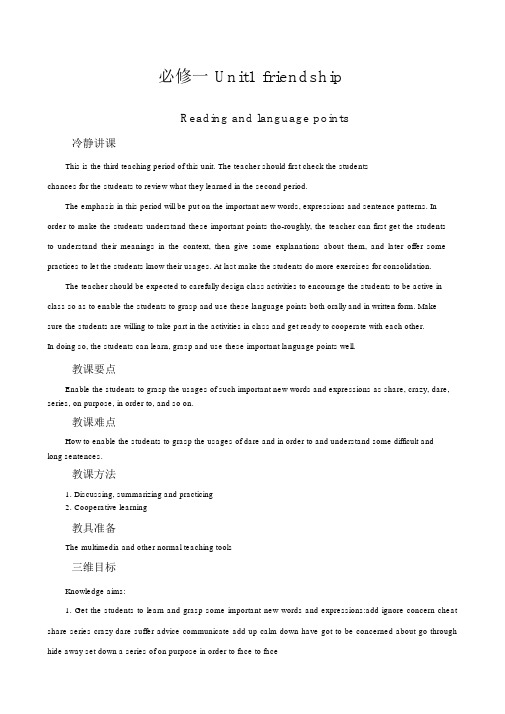
必修一 Unit1 friendshipReading and language points冷静讲课This is the third teaching period of this unit. The teacher should first check the studentschances for the students to review what they learned in the second period.The emphasis in this period will be put on the important new words, expressions and sentence patterns. In order to make the students understand these important points tho-roughly, the teacher can first get the studentsto understand their meanings in the context, then give some explanations about them, and later offer some practices to let the students know their usages. At last make the students do more exercises for consolidation.The teacher should be expected to carefully design class activities to encourage the students to be active in class so as to enable the students to grasp and use these language points both orally and in written form. Makesure the students are willing to take part in the activities in class and get ready to cooperate with each other.In doing so, the students can learn, grasp and use these important language points well.教课要点Enable the students to grasp the usages of such important new words and expressions as share, crazy, dare, series, on purpose, in order to, and so on.教课难点How to enable the students to grasp the usages of dare and in order to and understand some difficult andlong sentences.教课方法1.Discussing, summarizing and practicing2.Cooperative learning教具准备The multimedia and other normal teaching tools三维目标Knowledge aims:1. Get the students to learn and grasp some important new words and expressions:add ignore concern cheat share series crazy dare suffer advice communicate add up calm down have got to be concerned about go through hide away set down a series of on purpose in order to face to faceaccording to get along with fall in love with join in2. Get the students to understand some useful sentence patterns:1)Your friend, who doesn ’ t work hard, asks you to help him or her to cheat in the exam by looking at your paper,what will you do? (the Attributive Clause)2)I don ’ t want to set down a series of facts in a diary as most people do, but I want this diary itself to be myfriend. (as. . . )4)I wonder if it’ s because I haven’ t been able to be outdoors for so long time that I’ ve g everything to do with nature. (I wonder if/whether. . . ; so. . . that. . . )5). . . I stayed awake on purpose until half past eleven one evening in order to have a good look at the moonfor once by myself. (stay+adj. ; in order to do)Ability aims:1.Enable the students to use some useful words and expressions correctly.2.Enable the students to learn how to understand new words, expressions and difficult sentencesaccording to the context.Emotional aims:Develop the students’ spirit of cooperation and teamwork.教课过程设计方案(一)→Step 1 Revision1.Check the homework exercises.2.Ask some students to talk about their friends and what qualities and behavior make good friends. Also mayask them to talk about Anne’ s best friend, her diary.→Step 2 Reading and exerciseGet the students to try to find out the words and expressions as quickly as possible in the related parts andlet them learn some important new words and expressions by studying their contexts, clues and word-formation.The teacher shows the following on the screen.1.Find the words and expressions in Warming Up. Make sure that they have the same meanings given below.1)to join numbers, amount, etc. so as to find the total2)to act in a dishonest way in order to win; to take from (someone)in a dishonest way3)be worried about4)feeling unhappy about something; worried; anxious5)not to take notice of6)to make (of a living beings)calm7)must8)not fastened; tied up, shut up, etc. ; free from control2. Fill in the blanks with the words and expressions in the Reading to complete the following sentences.1)Friends are just the people who______________ your happiness and sorrow.2)You really don’ t know what we______________ while working on the farm.3)I have______________ everything that happened, as I remember it.4)She______________ singing and dancing.5)Tom did something wrong to his brother, but he said he didn6)______________ catch the first bus, she got up early this morning.’ t do that.______________7)The naughty boy______________ and his parents didn t find him anywhere’.8)A deep blue sky, white clouds, green trees and red flowers and fresh air held me_______________ .→Step 3 CheckingExplain the problems the students meet while checking the answers.Suggested answers:1. 1)add up2)cheat2. 1)share2)went3)be concerned aboutthrough 3)set down4)upset4)is crazy5)ignore 6)calm down7)have (got) toabout 5)on purpose 6)In order to8)loose7)hid away8)entirely in their power→Step 4 Language Points1. add vt. & vi.1)to put something with something else or with a group of other things 加;添;增加Do you want to add your name to the list?你愿意把名字添到名单上吗?Whisk the egg and then add the flour.打好鸡蛋此后再加面粉。
人教课标版高中英语必修1Unit1_Grammar名师教学设计

a. Change what has been said to an object clause or an infinitive phrase;
b. Change personal pronouns;
c. Change tenses;
d. Change adverbials of time and place;
1)“I don’t know the address of my new home,” said Anne.
2)“I’ve got tired of looking at nature through dirty curtains and dusty windows,” Anne said to her father.
e. Other cases.
1.培养学生的观察能力。
2.培养学生自己归纳总结的能力。
3.通过对应的练习强化学生对该语法的掌握。
通过小组合作,发现规律。
在发现规律的基础上学会在具体的语境中应用。
DELC6
3
深度加工知识
Step3
Exercises(10mins)
1.Ask the students to change the first four sentences from direct speech into indirect speech and the rest from indirect speech into direct speech.
She said that after hiding there for a long time, she had become crazy about nature.
新人教版高中英语必修一第一单元名师优秀教案
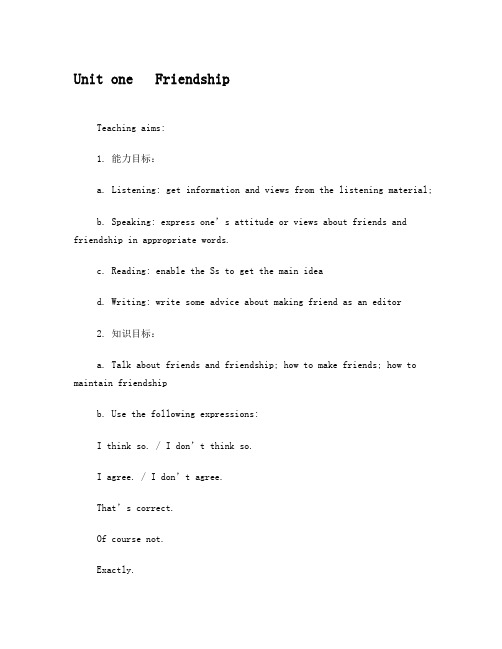
Unit one FriendshipTeaching aims:1. 能力目标:a. Listening: get information and views from the listening material;b. Speaking: express one’s attitude or views about friends and friendship in appropriate words.c. Reading: enable the Ss to get the main idead. Writing: write some advice about making friend as an editor2. 知识目标:a. Talk about friends and friendship; how to make friends; how to maintain friendshipb. Use the following expressions:I think so. / I don’t think so.I agree. / I don’t agree.That’s correct.Of course not.Exactly.I’m afraid not.c. to enable the Ss to control direct speech and indirect speechd. vocabulary: upset , calm , concern , loose, Netherlands, German, series, outdoors, dusk, crazy , purpose , thunder , entire,entirely, power , curtain, dusty, partner, settle, suffer , highway, recover, pack, suitcase, overcoat, teenager, exactly, disagree, grateful, dislike, tip , swap , itemadd up \ calm down\ have got to \be concerned about \ walk the dog \ go through \ set down \a series of \ on purpose \ in order to \ at dusk \ face to face \ no longer\not …any longer\ suffer from\ get\be tired of \ pack sth. up \get along with \ fall in love \ join in3. 情感目标:a. To arose Ss’ interest in learning English;b. To encourage Ss to be active in the activities and make Ss to be confident;c. To develop the ability to cooperate with others.4. 策略目标:a. To develop Ss’ cognitive strategy: taking notes while listening;b. To develop Ss’ communi cative strategies.5. 文化目标:to enable the Ss to get to know different opinions about making friends from different countries.Teaching steps:Period oneStep1. Warming up1. Ss listen to an English song AULD LANG SYNE.2. Brainstorming: let Ss say some words about friendship – honest, friendly, brave, humorous, funny, wise, kind, open-minded, responsible, helpful….Step 2. Talk about your old friends1. Ss talk about their old friends in Junior Middle School, talk about their appearance, personality, hobbies, etc.2. Self-introductionStep 3. Make new friends1. Ss go around and ask their new friends some information and fill in the following form2. Report to the class: who will probably be your friend. Why?Step 4. Do a surveySs do the survey in the text ,P1Sep 5. Listening and talkingDo Wb P41 (Talking). While Ss listen to the material, ask them to take notes about the speaker’s views of making friends.When Ss make their conversation, ask them to try to use the following expressions.I think so. / I don’t think so.I agree. / I don’t agree.That’s correct. Of course not. Exactly. I’m afraid not.Step 6. DiscussionDivide Ss four in one group and each group choose a topic to discuss. There are four topics.Topic 1: Why do you need friends? Make a list of reasons why friends are important to you.Topic 2: There is a saying “to have a good friend, you need to be a good friend.” What do you think of the saying and how can you be a good friend?Topic 3: Does a friend always have to be a person? What else can be your friend? Why?Topic 4: List some qualities of a person who does not make friend easily.Step 7. Summary1. Ask Ss themselves to summarize what is friendship and what is the most important in making friends.2. T shows more information about friendship and a poem about friendship.What is friendship?I want to find the answer to the questionWhat is friendship?When it rains, I think friendship is a small umbrella.It can give me a piece of clear sky.When I’m crying, I think friendship is a white handkerchief.It can wipe my tears dry.When I am sad, I think friendship is a warm word.It can bring me happiness again.When I am in trouble, I think friendship is a strong hand.It can help me escape my troubles.When I sit in a quiet place, I think friendship is a very wonderful feeling.It can’t be pulled and torn, because it is in everyone’s heart.It is there from the beginning to the end of our lives.3. Tell Ss: make new friends and keep the old; one is silver and the other is gold.Step 8. EvaluationSs finish the following evaluation form. Standard: A, B,CHomework:1. Look up the new words and expressions in warming up and pre-reading in a dictionary.2. Write a short passage about your best friend.Period twoStep1.Warming upActivity1: Suppose you have to stay indoors to hide yourself for a whole year. You can never go outdoors, otherwise you will be killed. You have no telephone, computer, or TV at home.How would you feel?What would you do?Four students a group discuss with each other for 2 minutes.Activity2: Play a short part of themovies Schindler’s ListStep2. PredictingStudents read the title of the passage and observe the pictures and the outline of it to guess:Who is Anne’s best friend?What will happen in the passage?Step3. SkimmingStudents skim the passage in 2 minutes to get the main idea : Who is Anne’s best friend?When did the story happen?Step4. ScanningStudents work in pairs to find the information required below: Annein World War ⅡStep5. Intensive readingStudents work in group of four to discuss the following open questions:1.Why did the windows stay closed?2.How did Anne feel?3.What do you think of Anne?4.Guess the meanings of “spellbound”, “ hold me entirely in their power” from the discourse(语篇,上下文).5.Which sentences attract you in the passage?Step6. ActivityFour students a group to discuss the situation:Suppose you four have to hide yourselves for 3 months. During the three months, you will be offered the basic food, water and clothes. Your group can take 5 things with you.What will you take? Why?How will you spend the 3 months?How will you treat each other and make friends ?Step7.AssignmentTask1.Surf the internet to find Anne’s Diary and read some of it. Print out a piece of the diary and write down your feelings after reading it on the page. We will share the pieces and your feelings with the whole class.Task2.Ex2、3 、4on Page3Period threeStep 1. Warming upCheck the Ss’ assignment: task 2Step 2. Language points:1. add (v.)1). To put together with something else so as to increase the number, size, importance, etc.增加,添加Please add something to what I’ve said, John.2). To join numbers, amount, etc so as to find the total 相加Add up these figures for me, please.add to something: to increase 增加What he did has added to out difficulties.add up to: to amount to 加起来等于;总计The cost added up to 100 million yuan.2. go through1). To examine carefully 仔细阅读或研究I went through the studen ts’ papers last night.2). To experience 经历,遭受或忍受You really don’t know what we went through while working on this project.3. crazy (adj.)1). mad, foolish 疯狂的,愚蠢的It’s crazy to go out in such hot weather.2). wildly excited; very interested 狂热的,着迷的She is crazy about dancing.4. be concerned about/for: be worried about 担心We’re all concerned about her safety.Step 3. Learning about language1. Finish Ex.1, 2 and 3. on Page 4.2. Direct speech and indirect speech: Ss do Ex.1 and 2 on Page 5. Then let the Ss themselves discover the structures.Step 4. PracticeUsing structures on Page 42: ask the Ss to use indirect speech to retell the story.Step 5. AssignmentFinish Wb. Ex, 1 and2 on page 41 and 42.Period fourStep 1. RevisionChec k the Ss’ assignment.Step 2. ReadingSs read the letter on page 6Notes:1. get along with2. fall in loveStep 3. ListeningSs should take notes while they are listening.1. first listening: Ss listen and answer the questions of part 2 on page 6.2. second listening: Ss listen again and finish part 3 on page 6.Step 4. ListeningSs listen to a story about Anne and try to finish Wb. Ex 1 and 2 on page 43 and page 44.Step 5. SpeakingSs work in groups of four. Design a questionnaire to find out what kind of friends your classmates are. They can use the quiz in the Warming up to help them.Step 6. Assignment1. Ss prepare the reading task on page 44.2. Surf the internet and find some material about friendship in different countries.Period fiveStep 1. Warming upSs say something about making friends and how to maintain friendship.。
- 1、下载文档前请自行甄别文档内容的完整性,平台不提供额外的编辑、内容补充、找答案等附加服务。
- 2、"仅部分预览"的文档,不可在线预览部分如存在完整性等问题,可反馈申请退款(可完整预览的文档不适用该条件!)。
- 3、如文档侵犯您的权益,请联系客服反馈,我们会尽快为您处理(人工客服工作时间:9:00-18:30)。
英语学科课时教学设计
检查结果及修改意见:
合格[ ] 不合格[ ]
备课组长(签字):
检查日期:年月日
品味人生
1、不管鸟的翅膀多么完美,如果不凭借空气,鸟就永远飞不到高空。
想象力是翅膀,客观实际是空气,只有两方面紧密结合,才能取得显着成绩。
2、想停下来深情地沉湎一番,怎奈行驶的船却没有铁锚;想回过头去重温旧梦,怎奈身后早已没有了归途。
因为时间的钟摆一刻也不曾停顿过,所以生命便赋予我们将在汹涌的大潮之中不停地颠簸。
3、真正痛苦的人,却在笑脸的背后,流着别人无法知道的眼泪,生活中我们笑得比谁都开心,可是当所有的人潮散去的时候,我们比谁都落寂。
4、温暖是飘飘洒洒的春雨;温暖是写在脸上的笑影;温暖是义无反顾的响应;温暖是一丝不苟的配合。
5、幸福,是一种人生的感悟,一种个人的体验。
也许,幸福是你风尘仆仆走进家门时亲切的笑脸;也许,幸福是你卧病床上百无聊赖时温馨的问候;也许,幸福是你屡遭挫折心灰意冷时劝慰的话语;也许,幸福是你历经艰辛获得成功时赞赏的掌声。
关键的是,你要有一副热爱生活的心肠,要有一个积极奋进的目标,要有一种矢志不渝的追求。
这样,你才能感受到幸福。
6、母爱是迷惘时苦口婆心的规劝;母爱是远行时一声殷切的叮咛;母爱是孤苦无助时慈祥的微笑。
7、淡淡素笺,浓浓墨韵,典雅的文字,浸染尘世情怀;悠悠岁月,袅袅茶香,别致的杯盏,盛满诗样芳华;云淡风轻,捧茗品文,灵动的音符,吟唱温馨暖语;春花秋月,红尘阡陌,放飞的思绪,漫过四季如歌。
读一段美文,品一盏香茗,听一曲琴音,拾一抹心情。
8、尘缘飞花,人去楼空,梦里花落为谁痛?顾眸流盼,几许痴缠。
把自己揉入了轮回里,忆起,在曾相逢的梦里;别离,在泪眼迷朦的花落间;心碎,在指尖的苍白中;淡落,在亘古的残梦中。
在夜莺凄凉的叹息里,让片片细腻的柔情,哽咽失语在暗夜的诗句里。
9、用不朽的“人”字支撑起来的美好风景,既有“虽体解吾犹未变兮”的执着吟哦,也有“我辈岂是蓬蒿人”的跌宕胸怀;既有“我以我血荐轩辕”的崇高追求,也有“敢教日月换新天”的豪放气魄。
33 我是一只蜜蜂,在祖国的花园里,飞来飞去,不知疲倦地为祖国酿制甘甜的蜂蜜;我是一只紫燕,在祖国的蓝天上,穿越千家万户,向祖国向人民报告春的信息;我是一滴雨点,在祖国的原野上,从天而降,滋润干渴的禾苗;我是一株青松,在祖国的边疆,傲然屹立,显示出庄严的身姿。
10、母爱是一滴甘露,亲吻干涸的泥土,它用细雨的温情,用钻石的坚毅,期待着闪着碎光的泥土的肥沃;母爱不是人生中的一个凝固点,而是一条流动的河,这条河造就了我们生命中美丽的情感之景。
11、青春是盛开的鲜花,用它艳丽的花瓣铺就人生的道路;青春是美妙的乐章,用它跳跃的音符谱写人生的旋律;青春是翱翔的雄鹰,用它矫健的翅膀搏击广阔的天宇;青春是奔腾的河流,用它倒海的气势冲垮陈旧的桎梏。
12、失败,是把有价值的东西毁灭给人看;成功,是把有价值的东西包装给人看。
成功的秘诀是不怕失败和不忘失败。
成功者都是从失败的炼狱中走出来的。
成功与失败循环往复,构成精彩的人生。
成功与失败的裁决,不是在起点,而是在终点。
13、母爱是一缕阳光,让你的心灵即便在寒冷的冬天也能感受到温暖如春;母爱是一泓清泉,让你的情感即使蒙上岁月的风尘仍然清澈澄净。
14、不要吝惜自己的爱,敞开自己的胸怀,多多给予,你会发现,你也已经沐浴在了爱河里。
15、奉献是爱心,勇于付出,你一定会收到意外之外的馈赠。
16、人生就像一条河,经历丰富,才能远源流长。
伟大的一生,像黄河一样跌宕起伏,像长江一样神奇壮美。
人生就像一座山,经历奇特才能蔚为大观。
伟大的一生,像黄山一样奇峰迭起,像泰山一样大气磅礴。
经历就是人生的硎石,生命的锋芒在磨砺中闪光;经历就是人生的矿石,生命的活力在提炼中释放。
经历就是体验,经历就是积淀。
没有体验就没有生存的质量;没有积淀,就没有生存的智慧。
人生的真谛在经历中探寻,人生的价值在经历中实现。
17、生命不是一张永远旋转的唱片;青春也不是一张永远不老的容颜。
爱情是一个永恒的故事,从冬说到夏,又从绿说到黄;步履是一个载着命运的轻舟,由南驶向北,又由近驶向远。
18、过去与未来,都离自己很遥远,关键是抓住现在,抓住当前。
19、采一点晨曦,装点一天的清新,捧一把阳光,温暖一季的心情。
雨中潇洒走一回,去释放心底的罗曼蒂克。
一段白云下的遐想,找回的是心灵空间的宽广和飞翔。
听一曲欢快流畅音乐,脸上没有了忧郁的浮云,心中燃烧着一团艳阳。
把笑意写在脸上,人生四季的良辰美景,即如小桥流水,也如风清月明!
20、生命本是一场漂泊的漫旅,遇见了谁都是一个美丽的意外。
我珍惜着每一个可以让我称做朋友的人,因为那是可以让漂泊的心驻足的地方。
有时候会被一句话感动,因为真诚;有时候会为一首歌流泪,因为自然。
要快乐,不止此时,而是一生!。
